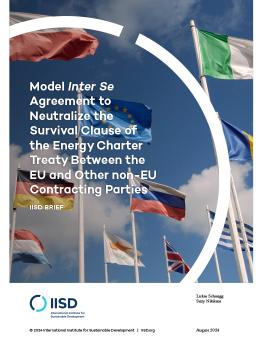
Model Inter Se Agreement to Neutralize the Survival Clause of the Energy Charter Treaty Between the EU and Other non-EU Contracting Parties
Major foreign investments in the fossil fuel sector flow between the European Union (EU) and other contracting parties of the Energy Charter Treaty (ECT). This brief demonstrates that an inter se modification of the ECT to neutralize its survival clause complies with the law of treaties and would prevent such investments from generating investment arbitration risks in the future. It also proposes a model inter se agreement that can be used as a basis for negotiation.
An inter se modification of the ECT between the EU and other non-EU ECT contracting parties (e.g., the United Kingdom) would comply with the law of treaties, allow states to neutralize the treaty's contentious survival clause, and prevent legacy arbitration claims by fossil fuel investors in the future.
The model agreement proposed here offers several practical advantages. It is designed to be open to current and former ECT contracting parties to which the survival clause currently applies. It is also open for later accession by other states that may withdraw from the ECT in the future. In addition, it accounts for the fact that some investors may nevertheless attempt to initiate arbitrations by laying out best-effort obligations among signatory states to collaborate to prevent such claims. And it does not interfere with the inapplicability of the ECT to intra-EU investment disputes, paving the way for the EU to join the initiative.
Participating experts
You might also be interested in
Submission to the Organisation for Economic Co-operation and Development on Investment Agreements and Climate Change
Submission to the OECD's public consultation on redesigning investment treaties in response to the climate crisis, contributed by CIEL, ClientEarth, and IISD.
Investor–State Disputes in the Fossil Fuel Industry
Phasing out fossil fuels is critical to global efforts to tackle climate change, but actions to curb emissions are hindered by protections granted under international investment law.
IISD: EU’s historic Energy Charter Treaty vote will boost energy transition
The European Parliament has voted for the European Union to withdraw from the climate-threatening Energy Charter Treaty.
EU exit from climate-killing energy treaty looms
Denmark joins a spate of EU nations including Germany, Spain, France and the Netherlands who are exiting the Energy Charter Treaty (ECT), an investment pact weaponized by big emitters to sue governments — most recently for phasing out fossil fuels.